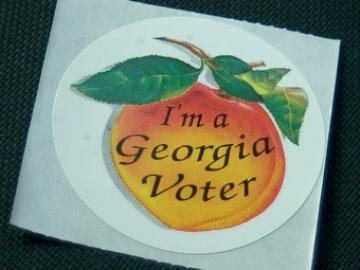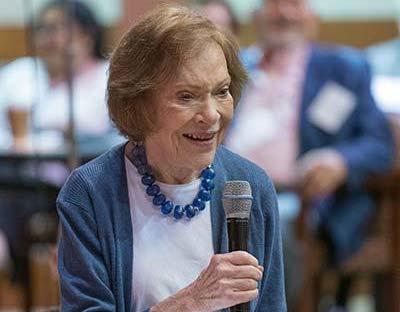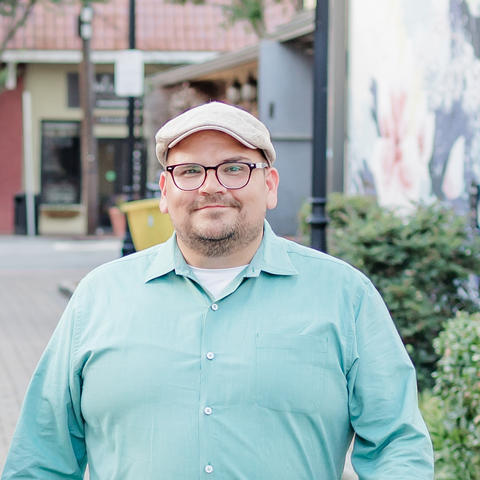
Section Branding
Header Content
Georgia Today: Trump hearing canceled; Election board meets again; Athens author on Norman Maclean
Primary Content
On the Tuesday, Nov. 19 edition of Georgia Today: A Georgia appeals court has canceled a hearing in the state's election interference case against President-elect Donald Trump; State Election Board says no more rules; Athens-based author Rebecca McCarthy discusses her biography of Norman Maclean.

Peter Biello: Welcome to the Georgia Today podcast from GPB News. Today is Tuesday, Nov. 19. I'm Peter Biello. On today's episode: A Georgia appeals court has canceled a hearing in the state's election interference case against President-elect Donald Trump. The State Election Board says no more rules — for now. And an author from Athens discusses her biography of the author of A River Runs Through It, Norman Mclean. These stories and more are coming up on this edition of Georgia Today.
Story 1
Peter Biello: A Georgia appeals court has canceled a hearing in the state's election interference case against President-elect Donald Trump and others. The hearing was scheduled for Dec. 5 and would have included oral arguments over whether Fulton County District Attorney Fani Willis should continue to prosecute the case. The Georgia Court of Appeals did not explain why it canceled the hearing. Trump and his co-defendants are accused of participating in a scheme to illegally try to overturn the 2020 presidential election in Georgia. But with Trump set to return to the White House in January, the future of the case against the once and future president was already in question.

Story 2
Peter Biello: The State Election Board has met for the first time since the November elections and has decided not to immediately pursue any more rulemaking. The Republican-majority board had rushed to pass a slew of new rules leading up to Election Day. But in a short meeting yesterday, the board passed only a resolution asking state lawmakers to require counties to make publicly available a list of all eligible voters during and after every election. Board member Janice Johnston spoke for the board majority.
Janice Johnston: There's nothing secret about this. There shouldn't be. This should be available to the counties, to the superintendents, to the candidates, and it should be available to the public.
Peter Biello: The board's lone Democrat said such a requirement could impose an administrative burden on counties.

Story 3
Peter Biello: Today marks one year since the death of former first lady Rosalynn Carter. She died in her hometown of Plains last year at the age of 96. Paige Alexander, CEO of the Carter Center in Atlanta, says her legacy of mental health advocacy lives on both at home and abroad.
Paige Alexander: We opened a Mental Health and Caregiving Advocacy office in Washington, D.C., to, again, make sure that people understand what their rights are. And globally, we've worked in Liberia, reestablishing their entire mental health professional field.
Peter Biello: Former President Jimmy Carter, who turned 100 years old in October, remains in Plains, having entered hospice care 21 months ago.
Story 4
Peter Biello: The founder of an artificial intelligence company that supplied technology to school districts in Atlanta, Los Angeles and New York has been arrested on fraud charges. Joanna Smith-Griffin is the founder of the AI technology company All Here Education Inc. that supplied schools with a chat bot designed to create learning plans for students. She was arrested today in North Carolina and accused of spending investor money on herself as her company spiraled into bankruptcy. Federal authorities say she lied to investors in order to collect millions of dollars illegally from them since 2020. It was not immediately clear who would represent her in court.
Story 5
Peter Biello: Atlanta City council members have renewed a city's contract to fund an initiative that helps nonviolent offenders avoid jail time. The vote yesterday came in a contentious meeting after the mayor's office questioned the diversion program's cost effectiveness. Atlanta Chief Operating Officer Lashonda Burks spoke for the administration of Mayor Andre Dickens.
LaChandra Burks: What we have seen is a huge increase in funding, but the numbers beginning to trickle down and that is a cause of concern for us, which is why we want to do a little more research into making sure we put some very strong metrics in place.
Peter Biello: Irate council members pushed back in a rare challenge to the administration, accusing it of moving goalposts in what they called a troubling special procurement process.
Story 6
Peter Biello: Georgia is one of 15 states that require health insurance plans to cover biomarker testing for lung cancer. Experts say the requirement is saving lives nationwide. GPB's Ellen Eldridge has more.
Ellen Eldridge: Over the last five years, survival rates for lung cancer have risen 26%. Lung cancer kills more people than any other cancer, but screening saves lives. Danna Thompson is the director of advocacy for the American Lung Association in Georgia. She says doctors can customize a treatment plan when genetic testing is available. But many Georgians do not have access to health care.
Danna Thompson: Without expanding Medicaid, we are leaving over 500,000 low-income Georgians without health coverage. So that means no screenings, no preventative care, no conversations with a doctor.
Ellen Eldridge: Thompson says older adults who smoke or who have a history of smoking cigarettes are at a higher risk for the disease. For GPB News, I'm Ellen Eldridge.

Story 7
Peter Biello: Farmers, restaurant owners and chefs gathered in Atlanta yesterday to talk about the impacts of climate change on the food industry. GPB's Amanda Andrews reports on the event hosted by the James Beard Foundation.
Amanda Andrews: Those gathered for the roundtable shared their concerns about the impacts of hot winters, aging farmers, rising ingredient prices and labor costs. They also spoke about possible solutions, like improving communication to limit waste and educating consumers about food sustainability. Delroy Dennisur has a 7-acre farm in Powder Springs. He says his partnerships with restaurants are crucial but getting harder to maintain.
Delroy Dennisur: With the fluctuating climate and not being able to predict some of our outputs, it's kind of hard to build those relationships. You know, we don't want to overpromise and under-delivered.
Amanda Andrews: Organizers also encouraged the community to contact Congress in support of the Farm Bill to provide funding for climate challenges. For GPB News, I'm Amanda Andrews.
Story 8
Peter Biello: Get ready for crowds this Thanksgiving. Georgians are expected to travel by car and plane in record numbers this holiday travel period. Auto Club AAA today predicted 2.3 million Georgians will travel 50 miles or more during a seven-day period. AAA attributes the growth in travel to declining inflation, strong income gains and an expected boost in consumer spending. Hartsfield-Jackson Atlanta International Airport also released its forecast today: 4.2 million people passing through the world's busiest airport during a 12-day period. ATL advises airport travelers to arrive early, avoid taking prohibited items through security, and take advantage of real-time airport information at ATL.com.
Story 9
Peter Biello: For anyone who has wanted for decades to write a book, the writer Norman Mclean serves as an inspiration. The acclaimed author of A River Runs Through It and other stories didn't publish fiction until he reached his 70s, and his debut went on to sell more than 2 million copies and inspired the 1992 Oscar-winning film by Robert Redford. Rebecca McCarthy is the Athens-based author of Norman Mclean: A Life of Letters and Rivers. In it, she writes about the Mclean that she knew and Mclean that she found through her research. She's a former journalist for the Atlanta Journal-Constitution, and she's with me now. Rebecca McCarthy, welcome to the program.
Rebecca McCarthy: Thank you for having me.
Peter Biello: You met Norman Maclean late in his life when you were both in Montana. He split his time while he was teaching between the University of Chicago and Montana. Tell us how you met him.
Rebecca McCarthy: I was introduced to him by my brother, my oldest brother, John, in Seely Lake, where John was working for the Forest Service. He was in charge of recreation on the Seely Lake Ranger District and had met Norman a couple of years before because one of John's duties was tending to the people who had leased land from the Forest Service around Seely Lake. And Norman was one of those summer people who did that.
Peter Biello: Now, as you write in this book, Norman Maclean and his father — early in his life, his father was his writing tutor and would make him write essays and then whittle them down until they were more concise. And then he'd throw them away when they were done. And you, as a young writer, had a sort of mentor relationship with him where he would critique your work. What was that experience like for you?
Rebecca McCarthy: Terrifying. I mean, I just didn't want to disappoint Norman. The paper I wrote for him that he really took me to task on was about a Browning poem, and I should have picked another Victorian poet because —
Peter Biello: He loved Robert Browning.
Rebecca McCarthy: He loved Browning, and his parents were in the Browning Society. But he was right. I didn't do the research on the poem and I didn't make my paper, as he said, something of distinction.
Peter Biello: And you were how old at the time?
Rebecca McCarthy: 19.
Peter Biello: 19. So you were already in college then?
Rebecca McCarthy: Yeah, I had started college at 17. So I decided to up my game and take it pretty seriously.
Peter Biello: So he taught at the University of Chicago. But he wasn't your teacher there?
Rebecca McCarthy: No, no. He had retired by the time I got there. Yeah, he taught there from '28 till '73. So he did a lot of teaching and had a lot of students.
Peter Biello: What can you tell us about him as a teacher?
Rebecca McCarthy: Oh, he was phenomenal. The people I spoke to who had him — I mean, he was a life-altering. Scientists who had never read Shakespeare became Shakespeare devotees. The University of Chicago gives out an award called the Quantrell Teaching Award, and it's given by undergraduate students. People vote. Norman's the only person who got it three times. I mean, he was terrifying — and he was beloved.
Peter Biello: You knew him while he was working on A River Runs Through It. Yes?
Rebecca McCarthy: Yeah.
Peter Biello: What did you know about what he was feeling as he was working through that story? And I should mention that it was — if you're not familiar with it, it seems very autobiographical for him. It's about a pair of brothers. The brother named Paul mimics the brother he had, [also named] Paul who died — was killed — and who likely had a gambling problem. So it's an autobiographical story and perhaps a difficult story for him to write, emotionally. But tell us, what did you know about his state of mind as he was working on that story?
Rebecca McCarthy: I knew nothing. I mean, he wasn't very revelatory. I was a kid. I believe he read parts of the story to my brother and sister-in-law, which would have been in 19 — the early '70s while she was still alive. I know that one time he read me part of it and said — you know, he would just kind of end up and go, "Well, darling, that's it." I mean, he was wrapped really tightly. He did not talk about his own emotions. So — but I do know when he finished, he read it to Jean and Joel, his daughter and son-in-law. And then he could cry for his brother. So I think — I don't know his state of mind, but I think it was a great relief for him to speak publicly about his brother. And yeah, there are autobiographical pieces in that story, but it's not an autobiography.
Peter Biello: Right. It's fiction.
Rebecca McCarthy: Yeah.
Peter Biello: He did attempt to write nonfiction before A River Runs Through It. He wanted to write about Custer and the Battle of Little Bighorn, but he never did finish that.
Rebecca McCarthy: No.
Peter Biello: How did he make that transition from wanting to write about history to then wanting to write about roughly himself in fiction?
Rebecca McCarthy: He really didn't know exactly what he wanted to say about Custer. [What] Norman wanted to explore was how someone who lost a battle, obviously, would end up in that famous picture — maybe you've seen it. It's a picture that shows Custer leading the charge and the Indians and all these dead Indians and cavalrymen on the ground. It was — Norman said it was in every bar from Seattle to Bangor. He became this hero through defeat. And he wanted to explore: Why did we do that? Was that an American thing?
Peter Biello: Well, based on both your personal relationship with him and the vast amount of research you've done about his life, what would you hope people remember about him?
Rebecca McCarthy: He was a very compassionate writer. I don't know. He was a very, very complicated person. You know, he was wrapped really tightly, but at the same time, he was — his traits are he was compassionate, and he was curious, very curious about other people. And he would go, you know, you would tell him something and he would take off his glasses and bite one of the arms and go, "No kidding." He was just — I've never met anybody like him. Nobody.
Peter Biello: Well, Rebecca McCarthy, thank you so much for telling us about him and for your book. We appreciate it.
Rebecca McCarthy: You're welcome. Thank you.
Peter Biello: McCarthy's book about Norman Mclean is the subject of the latest episode of Narrative Edge, GPB's podcast about books with Georgia connections. You can find Narrative Edge at GPB.org/NarrativeEdge or wherever you get your podcasts.
And that's it for this edition of Georgia Today. Thank you so much for tuning in and thanks also to Orlando Montoya for hosting this podcast yesterday. I am just about over my bout with seasonal allergies. Should be 100% by tomorrow — or at least I hope so. If you want to learn more about any of these stories, visit GPB.org/News. And remember to subscribe to this podcast. It's the best way to keep in touch with everything happening in Georgia. If you've got feedback, we'd love to hear from you. Email us. The address is GeorgiaToday@GPB.org. I'm Peter Biello. Thanks again for listening. We'll see you tomorrow.



